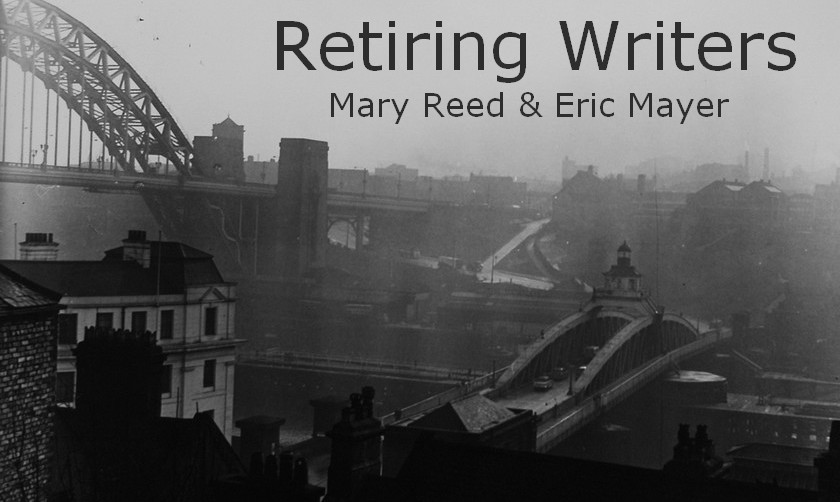Years ago I gave up printed books for e-books. As a legal editor, I worked all day in front of a monitor years before home computers became available to non-geeks like me so I was never averse to reading off a screen. Besides, a story isn't a physical entity. Books -- paper and ink and glue -- are only a means of transmitting the ideas from an author's mind to a reader's mind.
Today you can grab digital files from the Internet any place you happen to be but when books were all real objects instead of electronic bits and bytes you had to go to real places like libraries and bookstores to find them. I recall hiking to the library over the highway and through town, past the drug store, the barber shop and the five and dime and staggering home weighted down with Dr. Seuss titles. You don't get that kind of exercise clicking the download button.
That was nothing compared to lugging huge tote bags of books along endless New York City blocks, like trekking through Death Valley in summer or the Donner Pass in winter. Catching a bus in the cavernous maze of the Port Authority was an adventure in itself.
These day-long expeditions into the city were, in large part, to hunt books that weren't native to small, local stores. There were trade paperbacks, an exotic species back in the day, reserved mostly for literary and foreign authors I'd barely heard of -- Alain Robbe-Grillet, Arthur Rimbaud, Max Frisch. On the lighter side, city stores carried British editions of science fiction novels with bright glossy covers that made American paperbacks look like country cousins.
Amazon was still only the name of a river but you could order books via snail mail directly from publishers. Along with your order the publisher would send a sheet listing all their titles, which made for exciting reading. More excitement was to be had at school where once a month everyone had the option to order from the offerings of Scholastic. Well, it was exciting for me but then I was always a reader.
There's no doubt that a thick stack of pristine paperbacks newly unboxed gives one more of a frisson than a "download complete" message on a computer screen.
I grew up with physical books but by the time I was born they had become less of an art form, as evidenced by my grandparents' bookshelves. There I found volumes with marbled endsheets, gilt edging, and slick frontispieces. As a very young child I thought it strange and wonderful to see colored pictures printed right on the covers rather than the jackets.
Books themselves were something new and magical, My grandmother sat with me in her living room rocking chair and read Heidi, The Wind in the Willows and the Old Mother West Wind stories by Thornton W. Burgess featuring such characters as Reddy Fox, Unc' Billy Possum, Danny Meadow Mouse and Grandfather Frog. I remember the meadows and forests they lived in but I also recall their habitat as being the oddly small books with two color pictures on the cover and humorous illustrations tipped in amongst the pages.
I can't help thinking about the law books I wrote and edited. I was writing with a computer almost forty years ago but the legal tomes to which I contributed were still printed, stuck between covers, and ended up on law office shelves. These days attorneys don't have to rummage through hundreds of bound volumes and enormous specialized indexes. They search electronic databases with a few keystrokes.
Most legal books are just decoration. The next time you're watching a show and the scene moves to a lawyer's office check out the books on the shelves. Chances are you see some beige volumes with a red band toward the top of the spine and a black band below. These are mostly part of the National Reporter System, which began back in 1879 and contains decisions of the federal courts and state appellate courts. You often see them -- inappropriately -- in the offices of doctors, business tycoons, apparently any place the set designers want official looking volumes.
I wouldn't be surprised if today more National Reporters weren't sold for scenery than for legal research -- a good example of the declining importance of books as we knew them.

Hello again. I've spent about an hour looking for the best way to get in touch. I plan work on a Substack, would be very interested in your feedback.
ReplyDeleteRe books: I still enjoy the real thing, mostly hardbacks, and about 99% checked out from the library. I do read ebooks on occasion, they kept me going in 2020 and 2021, for months the library was closed and only ebooks could be checked out. I read ebooks on my iPad. Also enjoy audio books, I listen while I walk in the park and also in the car. Recently began to wear hearing aids, and now the audio book goes directly to my hearing aids, I don't even need ear buds!
I'm certain the first title I read was The Secret of the Old Clock, featuring Nancy Drew. I was about 9 years old. My grandmother's sister lived near my parents' house and I sort of took her tutelage for granted, but looking back I can see that she among my whole extended family was the one who gave me books, asked me about books, and got me started.